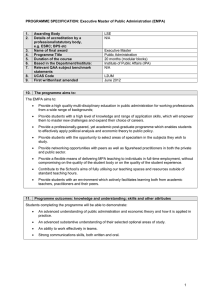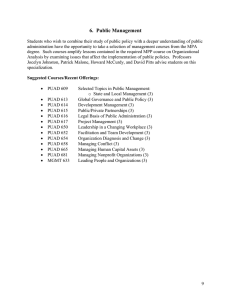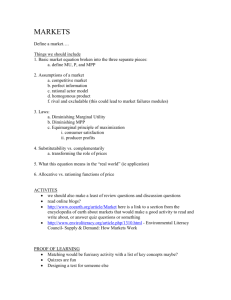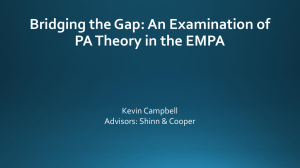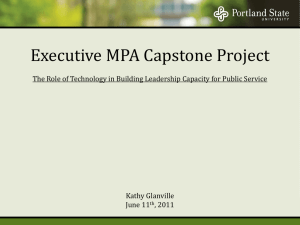PROGRAMME SPECIFICATION: Executive Master of Public Policy (EMPP) 1. Awarding Body
advertisement
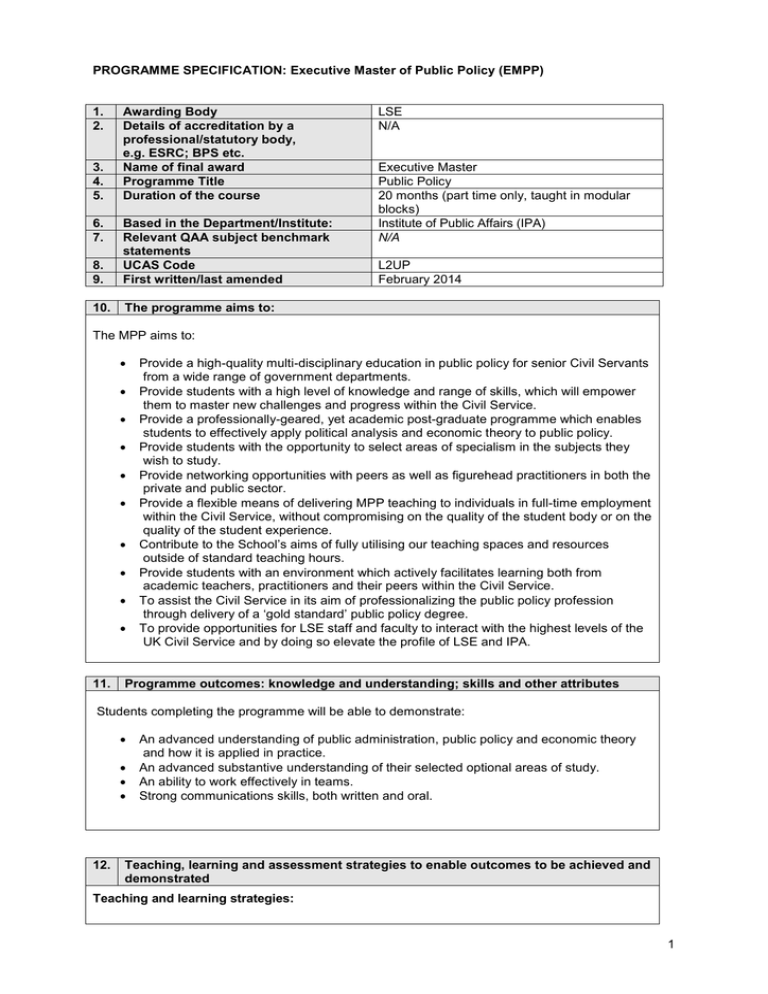
PROGRAMME SPECIFICATION: Executive Master of Public Policy (EMPP) 1. 2. 3. 4. 5. 6. 7. Awarding Body Details of accreditation by a professional/statutory body, e.g. ESRC; BPS etc. Name of final award Programme Title Duration of the course 8. 9. Based in the Department/Institute: Relevant QAA subject benchmark statements UCAS Code First written/last amended 10. The programme aims to: LSE N/A Executive Master Public Policy 20 months (part time only, taught in modular blocks) Institute of Public Affairs (IPA) N/A L2UP February 2014 The MPP aims to: 11. Provide a high-quality multi-disciplinary education in public policy for senior Civil Servants from a wide range of government departments. Provide students with a high level of knowledge and range of skills, which will empower them to master new challenges and progress within the Civil Service. Provide a professionally-geared, yet academic post-graduate programme which enables students to effectively apply political analysis and economic theory to public policy. Provide students with the opportunity to select areas of specialism in the subjects they wish to study. Provide networking opportunities with peers as well as figurehead practitioners in both the private and public sector. Provide a flexible means of delivering MPP teaching to individuals in full-time employment within the Civil Service, without compromising on the quality of the student body or on the quality of the student experience. Contribute to the School’s aims of fully utilising our teaching spaces and resources outside of standard teaching hours. Provide students with an environment which actively facilitates learning both from academic teachers, practitioners and their peers within the Civil Service. To assist the Civil Service in its aim of professionalizing the public policy profession through delivery of a ‘gold standard’ public policy degree. To provide opportunities for LSE staff and faculty to interact with the highest levels of the UK Civil Service and by doing so elevate the profile of LSE and IPA. Programme outcomes: knowledge and understanding; skills and other attributes Students completing the programme will be able to demonstrate: 12. An advanced understanding of public administration, public policy and economic theory and how it is applied in practice. An advanced substantive understanding of their selected optional areas of study. An ability to work effectively in teams. Strong communications skills, both written and oral. Teaching, learning and assessment strategies to enable outcomes to be achieved and demonstrated Teaching and learning strategies: 1 The teaching methods for MPP consist of lectures, seminars, case studies, teamwork exercises, presentations and a Capstone consulting project report. The seminar classes for each of the modules will encourage student participation through problem solving. The majority of modules provided will be based on existing EMPA modules. The teaching and delivery is expected to be challenging for the academics, as the students will be older, more confident and significantly more experienced than many LSE Masters students. The teaching of the week-long modules will be in modular blocks of 30 teaching hours, whilst .Public Policy in Practice modules are taught over extended weekends. This is in line with EMPA practice. If an option module fails to attract a sufficient number of students the Directors of the Programme will retain the right to cancel the delivery of that module. Given experience on the Executive MPA and the significantly increased number of students this is unlikely. Student option module preference will be established and modules to be run will be confirmed at least six months in advance. All of the MPP modules will be on Moodle and Learning Technology and Innovation (LTI) have been consulted regarding the range of other distance learning tools that are available. The costs associated with using these technologies have been factored into the final budget for the programme. Assessment strategies: The assessment for each module is outlined in section 3.4 and in the course guides attached at Annex A. The assessment methods include assessed essays, assessed data exercises, group presentations and a Capstone consulting project report. Student feedback for assessed work will be provided in the same way as for the Executive MPA Programme. 13. Programme structures and requirements, levels, modules and awards Executive Master of Public Policy Additional information 14. Criteria for admission to the programme Potential applicants will be identified initially by the Civil Service. Applicants will be drawn from the levels 6 and 7 of UK Civil Service, just below the Senior Civil Service that includes Permanent Secretaries, Director Generals and Heads of Policy Profession. This should ensure that candidates are high-performance, motivated to succeed, high-potential and experienced. Entry requirements for the MPP will be broadly based on those for the Executive MPA, namely: Minimum 2.1 undergraduate degree (or its equivalent) in any discipline Minimum 5 years work experience Two professional references Personal statement explaining the candidate’s interest and suitability for the programme, including career achievements and ambitions Resume or Curriculum Vitae. LSE will retain control over admissions with applications being reviewed by the Programme Directors and recommendations made to the Graduate Admissions Office regarding suitability. 15. Indicators of quality Indicators of quality on the current EMPA include: 1. Strong levels of interest, applications and recruitment for the first two EMPA intakes. 2. The high quality of EMPA students reflected in levels of seniority, prior academic qualification, significant professional experience, and promotion during the period of the programme. 3. Willingness to pay a premium fee to undertake the EMPA. 2 4. Willingness of organizations to sponsor students on the EMPA. 5. High quality of assessment reflected in grades, tutor and external examiner feedback. 6. The diversity of the class reflected in nationality, employment, location, gender and personal and professional experience. Many of these indicators are also likely to be present on the MPP with the additional benefits associated with being involved with one of the UK’s highest profile public policy organizations. 16. Methods for evaluating and improving the quality and standard of teaching and learning School level quality assurance processes include: 1. a system of initial programme approval, with input from the providers of resource-based services (including the Library, IT Services and the Academic Planning and Resources Committee) and including an external assessor's report, to be conducted by the School’s central academic bodies; 2. a system of initial course approval, with input from the providers of resource-based services and conducted by the School's central academic bodies; 3. a system of approval of major modifications to programmes and courses, conducted by the School's central academic bodies; 4. a system of central review of departmental taught provision every five years or so, informed by available evidence, including student views, the main purposes being to promote development, identify and disseminate good practice, and to flag any concerns over standards to departments, without adjudicating on them; 5. a system of gaining student feedback on their teaching and learning experience in the School; 6. periodic review by the School's academic bodies of its internal Codes of Practice; 7. due and appropriate consideration of national quality assurance requirements through the School's committee structure; and 8. departments have the following arrangements in place for assuring their quality and standards: 8.1. Staff-Student Liaison Committees for all students that meet regularly, with minutes of meetings produced and circulated to staff and students; 8.2. Departmental Staff meetings that involve all staff, meet at least three times per academic year, and consider information from any other extant departmental committees. Minutes should be produced and circulated to staff; 8.3. A Teaching Committee that involves appropriate departmental staff, meets regularly each academic session and considers all aspects of departmental learning and teaching, including new programme and course proposals. Minutes should be produced and circulated to members; 8.4. A system for ensuring the effective participation in the School's annual programme monitoring exercise; 8.5. A system for considering course and programme results annually, and revising taught provision as appropriate; 8.6. A system for considering student survey course results annually, and revising taught provision as appropriate; 8.7. A system for considering external examiners' reports, and acting on them, on an annual basis, with the School having an associated responsibility (a) to ensure that the system functions and (b) for any School-wide lessons on both good practice and areas of concern from the reports collectively. Quality assurance processes for MPP: In addition to those quality assurance processes outlined above the MPP will benefit from the following: dedicated programme team including Programme Directors, Programme Manager and Programme Officer. oversight of the Institute of Public Affairs Management Committee which includes the IPA Director and the Heads of major departments such as Economics and Government. feedback from a Civil Service Steering Committee comprising senior Civil Servants up to Permanent Secretary level. 3
